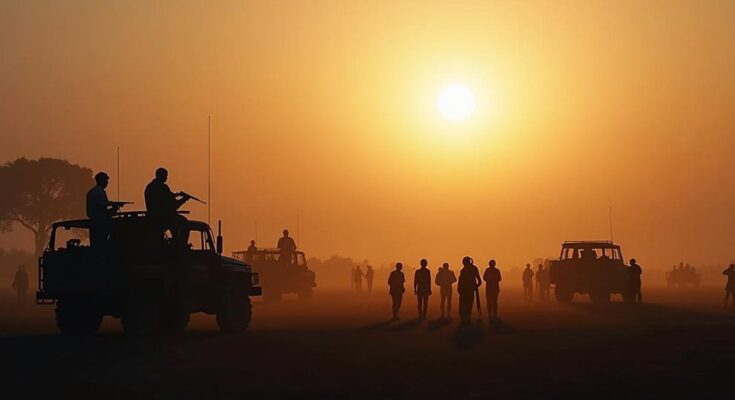Human Rights Watch has reported that the Rwandan army and a supporting militia have shelled displaced people camps in eastern Congo, causing civilian casualties and obstructing aid. The conflict, involving over 120 armed groups, has resulted in the displacement of approximately 6 million individuals. The M23 rebel group continues to threaten stability in the region, with allegations of Rwandan military support fueling the violence and concerns raised at the U.N. regarding Rwanda’s involvement.
Kinshasa, Congo – According to a recent report by Human Rights Watch, the Rwandan army, along with a militia it supports, has launched artillery attacks on camps housing displaced individuals in eastern Congo. This report further indicates that both parties have been implicated in the killing of camp residents, committing acts of sexual violence, and hindering humanitarian aid efforts. Eastern Congo is currently afflicted by extensive armed conflict, with over 120 armed groups contending for control over resources, territory, and power. The region has witnessed grave human rights violations, including mass killings and rapes, leading to the displacement of around six million individuals. One significant player in this violence is the March 23 Movement (M23), a rebel group predominantly composed of ethnic Tutsis that splintered from the Congolese army over a decade ago. M23 captured the provincial capital, Goma, in 2012, a city that now faces renewed threats as the group expands its influence. The Congolese government has accused Rwandan forces of instigating aggression and committing war crimes within its territory. Expert analyses from both the United States and the United Nations have criticized Rwanda for allegedly providing military support to M23, a claim that Rwanda denies. However, Rwanda acknowledged in February that it maintains a military presence, including missile systems, in eastern Congo, citing the need to protect its security in response to Congolese troop movements near the border. In July, United Nations experts estimated that the Rwandan military presence in eastern Congo ranges from 3,000 to 4,000 troops, who are reportedly collaborating with the M23 group, which has been making significant territorial gains. Recently, a regional court in East Africa commenced legal proceedings for a case initiated by Congo against Rwanda for purported violations of its sovereignty and territorial integrity. Moreover, in a speech at the United Nations General Assembly, President Felix Tshisekedi of Congo urged the implementation of sanctions against Rwanda due to its presumed support of M23.
The conflict in eastern Congo is deeply rooted in a complex situation involving numerous armed factions, historical ethnic tensions, and struggles over lucrative resources such as minerals. The M23 armed group, primarily composed of ethnic Tutsis, rose to prominence following a backdrop of civil war and regional instability influenced by the aftermath of the Rwandan Genocide. Human Rights Watch has documented numerous atrocities in this region, highlighting the dire humanitarian crisis affecting millions of displaced persons. International oversight, including investigations by U.N. experts, has increasingly focused on the roles played by neighboring states such as Rwanda, which has been accused of exacerbating the conflict by providing support to rebel groups. The political implications of this situation extend into regional relations, raising concerns for stability not only in Congo but throughout the Great Lakes region of Africa.
The situation in eastern Congo remains precarious, marked by ongoing violence and severe human rights abuses perpetrated by various armed groups, including support from Rwanda for the M23 movement. With millions displaced and the humanitarian situation deteriorating, regional tensions are escalating, particularly as Congolese leadership calls for international accountability against perceived aggressions from their neighboring state. The unfolding legal proceedings and diplomatic engagements in response to these violations will be critical in determining the future stability of the region.
Original Source: www.washingtonpost.com




